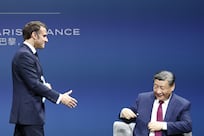The new American president is setting a decidedly different tone in Washington, but there are, of course, aspects of the UAE-US relationship that will not change: the two countries share a close and important strategic partnership. That said, the UAE must also protect and defend its own interests. It cannot afford to be politically or economically isolationist.
As we have seen in just a few dizzying days of the Trump presidency, this is not a regular transition in America.
The president’s recent executive order to ban “terror-prone” Muslims from entering the United States has far-reaching economic and personal ramifications: from major talents, such as an Oscar-nominated filmmaker not being able to access the country, to the ranks of globally renowned educational institutions, who would lose star students if they are forced to return to less uncertain environments.
When doors are being closed, we should broaden our perspectives. There is a reason to do this, which I will attempt to shed light on here. For the UAE, it may be a huge opportunity. It may also be a significant risk.
Since the Brexit referendum in the United Kingdom and the election of Donald Trump in the US, many commentators and analysts have struggled to make sense of these seismic political events. Some have called these votes the “great cries of the forgotten man”, others have called them a surge in populism.
We must avoid too many reductive assessments. While Brexit garnered a majority of votes in the UK, Donald Trump – who lost the US popular vote by three million votes and assumed office with a historic low approval rating – did not ride an unstoppable wave of populism into the White House.
This is important to remember because of what these movements do appear to share in common: protectionist and isolationist attitudes to global movement, suspicion about the industries of the future, a desire to return to former glories and streaks of xenophobia and anti-intellectualism expressed as a willingness to challenge the position of elites. All of these factors are seemingly incompatible with the state of our world today, in which globalisation is the accepted norm.
As the World Economic Forum was taking place in Davos last month, some parts of the media were discussing the “death of the elites” and the “demise of Davos man” and talking about the extinction of “globalist” gatherings. Rumours of its death are, of course, greatly exaggerated, although the demographic of this gathering, and the focus of world power, is shifting.
The most consequential keynote speech at Davos was delivered by China’s president Xi Jinping, who attended the forum for the first time. In it, he summed up the challenge of globalism: “One should not just retreat to the harbour when encountering a storm, for this will never get us to the other shore of the ocean. We must redouble efforts to develop global connectivity to enable all countries to achieve interconnected growth and share prosperity.”
The connectivity point is important. If you think about a digitally reimagined version of the Silk Road trade routes, you’ll see that this is what makes most sense for the transnational trade and cooperation we are reliant on today. The UAE, of course, is at the heart of this – all anyone needs to do is look at a map to see the advantages of its geography. With the withdrawal of some economies into isolationism and protectionism, the UAE can open a door whenever one is closed elsewhere.
If we ignore this opening, we might not only miss a vital opportunity, but we may also peg ourselves to a failing economic formula of retreat.
For clarity, it is worth saying that the ideal situation would involve the West collaborating in the vision for a shared future. Nobody wishes for the decline of allies in the United States or Europe.
But here we must appreciate that the decline of any civilisation cannot come exclusively from without. This is where precious voices of reason are most desperately needed.
Remember the courage of Wu Jianmin, the late Chinese diplomat, who reacted to the increasingly shrill and triumphalist drums of jingoism by advising younger diplomats that “we must be clear that populism is essentially against reform, and nationalism is essentially against opening up”?
It is this sort of candor that needs to rise to the fore. It is not a weakness for leaders to be honest with their citizens and explain that there is no sense in thinking about an infinite number of “American Centuries” to come. The very nature of our interconnected globe will make the idea of a unipolar world untenable.
Abu Dhabi and Dubai continue to emerge as important places of commerce and culture of the 21st century; China continues to rise as a major power; India continues on its path towards massive infrastructural growth and harnessing its immense creative human capital – but all these things do not need to translate into the decline of the West unless that part of the world actively chooses this.
Western nations can choose – through parochial movements that represent the very worst of populism – to point themselves to a slow and steady decline. Or they can find another way.
The empires of the past have been consigned to history and the rest of the world is going to move forward. The emergence of important centres of commerce and culture in the Arabian Gulf can help the commerce and culture of European and American cities.
The fact that the following decades may bring us to a place where we are faced with the reality of a “Chinese Century” does not mean that this very same century cannot also be an “American Century”.
In fact, with the increased potential for trade, cooperation and communication to happen at a faster rate than ever before, this century could be the greatest, most lucrative and most prosperous “American Century” in addition to being the same for so many others.
Taking advantage of the unprecedented tools at our disposal for international cooperation presents us with the potential for mutually assured prosperity and peace.
We can have all of this and more but we have to take off our armour, reject fear and begin the much harder process of building bridges. Bans and walls are unnecessary self-inflicted wounds to a country that has fallen into isolationist protectionism.
Back in Davos, Mr Xi remarked that “pursuing protectionism is like locking oneself in a dark room. While wind and rain may be kept outside, that dark room will also block light and air.”
Indeed. And it doesn’t take an elite mind to realise that light and air are vital to sustaining life.
Mohammed Fairouz is an Emirati-American composer





